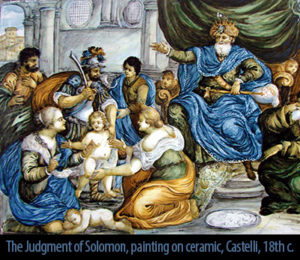I hated all my toil in which I toil under the sun, seeing that I must leave it to the man who will come after me, and who knows whether he will be wise or a fool? Yet he will be master of all for which I toiled and used my wisdom under the sun. This also is vanity. So I turned about and gave my heart up to despair over all the toil of my labors under the sun, because sometimes a person who has toiled with wisdom and knowledge and skill must leave everything to be enjoyed by someone who did not toil for it. This also is vanity and a great evil. What has a man from all the toil and striving of heart with which he toils beneath the sun? For all his days are full of sorrow, and his work is a vexation. Even in the night his heart does not rest. This also is vanity.
There is nothing better for a person than that he should eat and drink and find enjoyment in his toil. This also, I saw, is from the hand of God, for apart from him who can eat or who can have enjoyment? For to the one who pleases him God has given wisdom and knowledge and joy, but to the sinner he has given the business of gathering and collecting, only to give to one who pleases God. This also is vanity and a striving after wind. – Ecclesiastes 2:18-26
You won’t have to look hard to find someone who says disparaging things about Preacher Solomon concerning this passage. He’s called everything from “impious” to “a sociopath.” There are books with long discussions about his “depression” and “mental health” as he is psychoanalyzed by, incidentally, the most overweight, medicated, addicted, and depressed society in, perhaps, the history of the world. He says, “So I turned about and gave my heart up to despair over all the toil of my labors under the sun, because sometimes a person who has toiled with wisdom and knowledge and skill must leave everything to be enjoyed by someone who did not toil for it.” And he adds that the man who toils and whose heart strives, “…all his days are full of sorrow, and his work is a vexation.” That does sound pretty bad. Is there something seriously wrong with him?
On the contrary, I would argue that what he has written in the first paragraph above is evidence of his piety. We can understand this when considering the context of what has come before. His argument since the beginning of the book has been that wisdom has special regard for “toil,” which is trying to leverage a surplus or special advantage in life under the sun. This regard is the refrain that such toil is nothing but a vapor and an attempt at shepherding wind. Now we find that Preacher Solomon “hated all [his] toil in which [he] toiled under the sun.” It is good to hate foolish things. To do so is to trample on the idols that threaten to corrupt our worship and trust of God.
Nonetheless, he doesn’t leave it there. The second paragraph ends the chapter on a surprisingly upbeat note. He’s given a clear reason for the hatred of this toil: “I must leave it to the man who will come after me, and who knows whether he will be wise or a fool? Yet he will be master of all for which I toiled and used my wisdom under the sun.” What is this? You guessed it: “This also is [vapor].” In light of this reason for his hatred of the toil, he offers an alternative: “There is nothing better for a person than that he should eat and drink and find enjoyment in his toil.”
He even says that this is “from the hand of God” since “apart from him who can eat or who can have enjoyment?” If control under the sun is not an option, is there anything left? Yes! God has, from His hand, given us eating, drinking, and enjoyment in work (Solomon’s use of “toil” here is not the same as the previous uses of “striving for a surplus”). I will argue in the sermon this Sunday that this eating and drinking is Solomon’s way of talking about the ritual covenant meals that the Israelites enjoyed as fellowship with God. For now, though, allow such wisdom to sink in a bit.
Human life in all its mystery is a gift from God. What can we do with the good things God has given us? Give thanks for them and glorify God by enjoying them. That’s a wise alternative to trying to leverage them for power and a surplus that will last long after we do. As always, we see that Jesus exemplifies this wisdom. He never neglects to give overt and bold thanks to the Father, He enjoys the good things as He eats and drinks with sinners, and He promises us life everlasting under, not the sun, but under the Light of the World, which never goes dark.
Come hear it preached and enacted in the supper with Jesus this Sunday.
